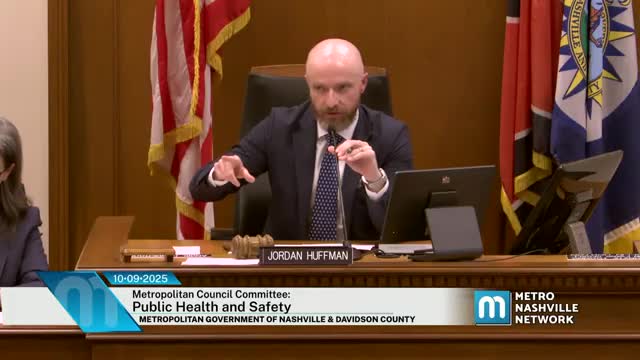Committee approves amendment to motor‑vehicle noise code using 'plainly audible' standard inside dwellings
October 10, 2025 | Public Health & Safety Meetings, Nashville, Davidson County, Tennessee
This article was created by AI summarizing key points discussed. AI makes mistakes, so for full details and context, please refer to the video of the full meeting. Please report any errors so we can fix them. Report an error »

The Public Health & Safety Committee approved an amendment to Section 9.20‑020 of the Metropolitan Code of Laws that makes motor‑vehicle noise a violation if it is plainly audible inside a dwelling structure.
Sponsor Councilmember Coopin said the change targets unmuffled cars and aims to give police a tool to address noise that carries into homes. “This bill would make it a violation if you are within a dwelling structure and you can hear that noise,” Coopin said, adding an amendment to exempt Metro vehicles, emergency vehicles and any vehicle operation that is contractually allowed by the Metro government.
Committee members questioned enforceability. Councilmember Wiener asked whether a decibel standard might be clearer for people with differing hearing abilities. Deputy Chief Chris Gilder of the Metropolitan Nashville Police Department responded that in criminal statutes the test is often whether the noise is plainly audible to an ordinary‑hearing person and that an officer who responds can document that observation. “If it's plainly audible to the officer that's responded or is trying to take enforcement action and they can articulate that, whatever their hearing capabilities are, then I think it's probably met the threshold and they would cite for that offense,” Gilder said.
Committee legal staff read the code definition of plainly audible: “any sound which clearly can be heard by unimpaired auditory senses. However, words or phrase phrases need not be discernible and said sound shall include bass reverberation,” and said that distinction means the standard does not turn on whether windows are open or closed.
Councilmember Coopin said the plain‑audibility language is already used elsewhere in the code and that the amendment builds on existing language. The committee approved Coopin’s amendment and then approved the ordinance as amended. Councilmember Kimbrough recorded a dissenting vote; the chair announced the motion passed as amended with one no.
The measure gives police a compliance tool but leaves open questions about enforcement practice and likely will return for further review, several members said.
Sponsor Councilmember Coopin said the change targets unmuffled cars and aims to give police a tool to address noise that carries into homes. “This bill would make it a violation if you are within a dwelling structure and you can hear that noise,” Coopin said, adding an amendment to exempt Metro vehicles, emergency vehicles and any vehicle operation that is contractually allowed by the Metro government.
Committee members questioned enforceability. Councilmember Wiener asked whether a decibel standard might be clearer for people with differing hearing abilities. Deputy Chief Chris Gilder of the Metropolitan Nashville Police Department responded that in criminal statutes the test is often whether the noise is plainly audible to an ordinary‑hearing person and that an officer who responds can document that observation. “If it's plainly audible to the officer that's responded or is trying to take enforcement action and they can articulate that, whatever their hearing capabilities are, then I think it's probably met the threshold and they would cite for that offense,” Gilder said.
Committee legal staff read the code definition of plainly audible: “any sound which clearly can be heard by unimpaired auditory senses. However, words or phrase phrases need not be discernible and said sound shall include bass reverberation,” and said that distinction means the standard does not turn on whether windows are open or closed.
Councilmember Coopin said the plain‑audibility language is already used elsewhere in the code and that the amendment builds on existing language. The committee approved Coopin’s amendment and then approved the ordinance as amended. Councilmember Kimbrough recorded a dissenting vote; the chair announced the motion passed as amended with one no.
The measure gives police a compliance tool but leaves open questions about enforcement practice and likely will return for further review, several members said.
View full meeting
This article is based on a recent meeting—watch the full video and explore the complete transcript for deeper insights into the discussion.
View full meeting
